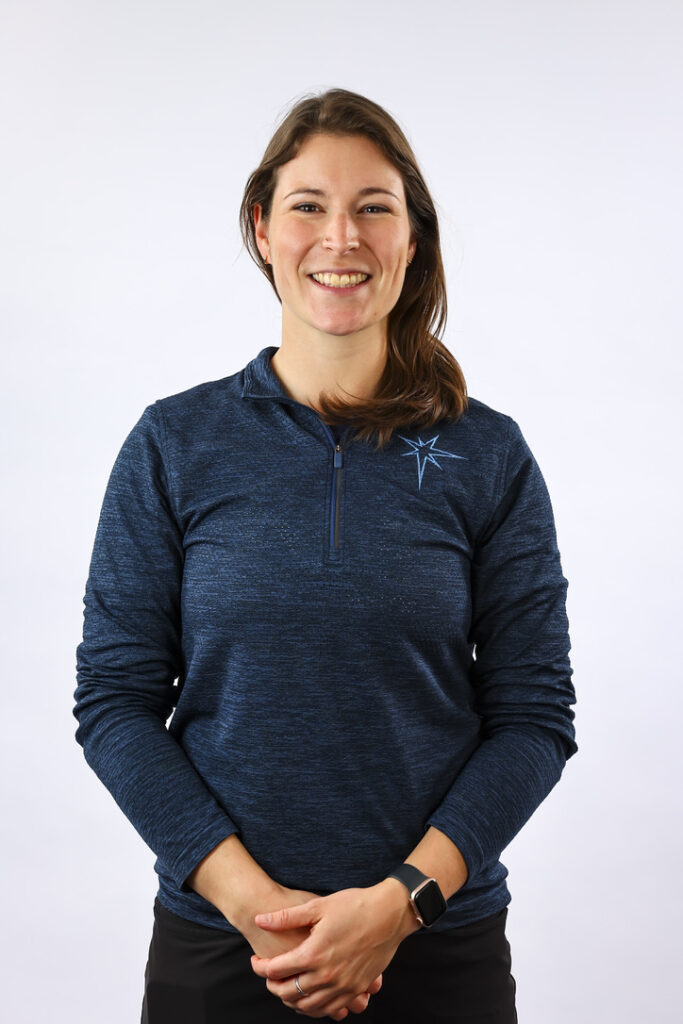Getting players back into the swing of it

When Sarah Clay ’15 was learning rehab basics in the Clark Athletics training room as an undergrad, she had no idea that 10 years later she’d be working in major league sports.
Clay is now a physical therapist for the Tampa Bay Rays, and the first woman to serve on the Major League Baseball team’s medical staff. She joined the Rays in 2023 as a minor league physical therapist and moved up to the big club this fall.
“As someone who’s still relatively new to the field, the trust my team has in my abilities and potential means a lot,” says Clay, who majored in biology at Clark and studied in the Prehealth Advising Program. “I’m grateful for the support and mentorship I’ve received so far and I’m eager to keep learning and growing in this new capacity.”
Her role includes a lot of manual therapy to help injured players get back on the field, as well as building rehab programs.
“It’s a unique environment where the stakes are high, but the rewards are even higher, especially when you see an athlete get back on the field or exceed their previous performance,” she says. “To have that impact at this high of a level is both exciting and humbling. And, because treatments are in the morning, I’m excited to be part of the game time experience that we weren’t able to have at the minor league level.”
Rehab begins in early January and goes about five days per week, involving everything from stretching to gym workouts to baseball drills, like throwing, hitting, and defense. When spring training officially starts in February, the schedule ramps up to seven days per week. During the regular season, Clay typically works six days per week until October.
“Clark made me the best person I could be. You can learn how to do any kind of skill, but if you don’t have the empathy, the worldview, the compassion for it, then it doesn’t matter.”
Sarah Clay ’15
Players need care after surgery, often for procedures on their elbows, shoulders, or knees. Clay and her colleagues help them with immediate post-op care, get them back into the gym, and then finally back onto the diamond.
“I always knew I wanted to be in health care,” says Clay, who studied physical therapy at the University of St. Augustine for Health Sciences in Florida. “I like working with my hands, being able to help people, and having the instant gratification of seeing someone’s life improve from my help.”
After Clark, Clay moved to Oakland, California, and had a variety of jobs. She was a barista, a soccer and lacrosse coach, and worked in a pulmonary lab. That was when she decided to commit to physical therapy school and enrolled at St. Augustine. Her final clinical trial during graduate school was with the Minnesota Twins during spring training.
“Getting into professional sports was a pretty great end to school,” she says. It was during that time that Clay secured her job with the Rays. She often reflects on what it means to be a woman in professional sports.
“It’s been really cool to see more and more women working in this field, honestly more than I expected, but there’s still a long way to go,” she says. “Being an openly queer woman in this space means a great deal to me. I feel it represents breaking down long-established barriers and showing other women of varying identities, whether in sports medicine or other male-dominated fields, that they belong here, too. But at the end of the day, it’s about providing exceptional care to athletes and helping them reach their peak potential — regardless of gender.”
Growing up, Clay played soccer, basketball, track, and tennis. She competed on Clark’s women’s tennis and lacrosse teams.
“I think it’s one of the best decisions I made in college,” she says. “I made so many friends and had the best time.” Working in the training room as a student-athlete “was definitely integral to where I am now.”
Clay also worked at Acoustic Java (now Belen’s) during her time as a Clarkie and enjoyed pouring coffee for professors and students whom she wouldn’t have met otherwise. She says assisting in biology Professor Néva Meyer’s lab taught her about research, which laid the groundwork for her side gig reviewing manuscripts for journals such as The International Journal of Sports Physical Therapy and Sports Health.
“Clark made me the best person I could be,” she says. “You can learn how to do any kind of skill, but if you don’t have the empathy, the worldview, the compassion for it, then it doesn’t matter.”


